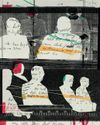
In n summer, life in Provincetown, Massachusetts, is idyllic and fairly simple: among the few decisions a visitor has to make is whether to attend Tea (short for Tea Dance), a party held daily from 4 to 7 P.M., on the enormous pool deck of the Boatslip, a hotel and beach club in the town's West End. Every day around three-thirty, a migration begins: bodies, in various states of undress and drag, drawn, as if by magnets, down Commercial Street. At the height of the season during Bear Week, in July, or Carnival, in August-the deck might be hundreds deep, bass thumping, drinks sloshing, and the possibility of friendship, or more, palpable in the air.
Attendance was sparse on the sunny Tuesday I went to Tea, this past June, but a handful of people were grooving blissfully below a disco ball on the dance floor. Near a spirited group of young men wearing brightly colored jumpsuits, including one patterned with eggplants, I chatted with Jeremy Hobson, a publicradio journalist who spends part of the year in P-town, as it's affectionately known. "I would say this is, if not the center, one of two or three centers of gay America,"Hobson said. "No matter how gay you can be on the streets of West Hollywood and Chelsea, it's nothing like this. You could walk down the street in a jockstrap and nobody would bat an eye.
Provincetown, also called Land's End, sits at the northernmost tip of Cape Cod, a spit of sand which resembles the fist at the end of a flexed arm.
In 1620, it was the site of the Mayflower's initial landing, a distinction that is often overshadowed by nearby Plymouth, where the Pilgrims settled instead. By 1899, Provincetown was home to a small population of New Englanders, who had displaced the Wampanoag and Nauset tribes, and to Portuguese immigrants working as whalers and fishermen.
That year, an American painter named Charles Hawthorne chose it as the location for the Cape Cod School of Art.
This story is from the July 29, 2024 edition of The New Yorker.
Start your 7-day Magzter GOLD free trial to access thousands of curated premium stories, and 9,000+ magazines and newspapers.
Already a subscriber ? Sign In
This story is from the July 29, 2024 edition of The New Yorker.
Start your 7-day Magzter GOLD free trial to access thousands of curated premium stories, and 9,000+ magazines and newspapers.
Already a subscriber? Sign In

GET IT TOGETHER
In the beginning was the mob, and the mob was bad. In Gibbon’s 1776 “Decline and Fall of the Roman Empire,” the Roman mob makes regular appearances, usually at the instigation of a demagogue, loudly demanding to be placated with free food and entertainment (“bread and circuses”), and, though they don’t get to rule, they sometimes get to choose who will.

GAINING CONTROL
The frenemies who fought to bring contraception to this country.

REBELS WITH A CAUSE
In the new FX/Hulu series “Say Nothing,” life as an armed revolutionary during the Troubles has—at least at first—an air of glamour.

AGAINST THE CURRENT
\"Give Me Carmelita Tropicana!,\" at Soho Rep, and \"Gatz,\" at the Public.

METAMORPHOSIS
The director Marielle Heller explores the feral side of child rearing.

THE BIG SPIN
A district attorney's office investigates how its prosecutors picked death-penalty juries.

THIS ELECTION JUST PROVES WHAT I ALREADY BELIEVED
I hate to say I told you so, but here we are. Kamala Harris’s loss will go down in history as a catastrophe that could have easily been avoided if more people had thought whatever I happen to think.

HOLD YOUR TONGUE
Can the world's most populous country protect its languages?

A LONG WAY HOME
Ordinarily, I hate staying at someone's house, but when Hugh and I visited his friend Mary in Maine we had no other choice.

YULE RULES
“Christmas Eve in Miller’s Point.”